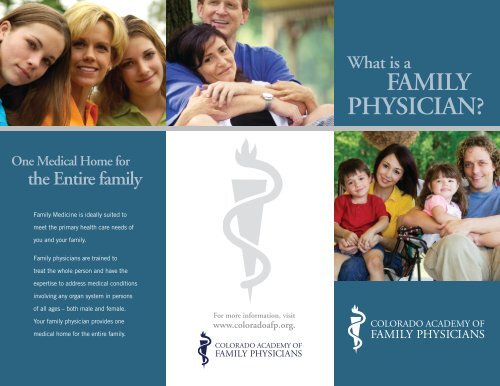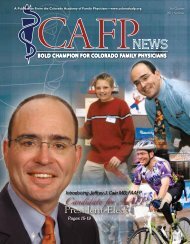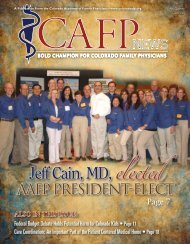Brochure - Colorado Academy of Family Physicians
Brochure - Colorado Academy of Family Physicians
Brochure - Colorado Academy of Family Physicians
You also want an ePaper? Increase the reach of your titles
YUMPU automatically turns print PDFs into web optimized ePapers that Google loves.
What is a<br />
FAMILY<br />
PHYSICIAN?<br />
One Medical Home for<br />
the Entire family<br />
<strong>Family</strong> Medicine is ideally suited to<br />
meet the primary health care needs <strong>of</strong><br />
you and your family.<br />
<strong>Family</strong> physicians are trained to<br />
treat the whole person and have the<br />
expertise to address medical conditions<br />
involving any organ system in persons<br />
<strong>of</strong> all ages – both male and female.<br />
Your family physician provides one<br />
medical home for the entire family.<br />
For more information, visit<br />
www.coloradoafp.org.
Well trained to treat<br />
all your health<br />
concerns<br />
<strong>Family</strong> physicians have a unique set <strong>of</strong> skills<br />
that they acquire in their family medicine<br />
education.<br />
<strong>Physicians</strong> who specialize in family medicine<br />
complete seven years <strong>of</strong> training. It begins<br />
with four years <strong>of</strong> medical school followed by<br />
three years in a residency program. During<br />
their formal residency, family physicians<br />
receive training in several major medical<br />
areas, including:<br />
■ Care for all ages from newborns and<br />
children to the elderly<br />
■ Care for chronic diseases such as<br />
diabetes, heart disease and asthma<br />
■ Emergency medical care<br />
■ Mental health and behavioral care<br />
■ Minor surgical procedures<br />
■ Well-woman care, reproductive<br />
counseling and family planning<br />
■ Ear, nose and throat care<br />
■ Eye care<br />
■ Bone and joint care<br />
■ Pregnancy and delivery care<br />
Staying on the Cutting Edge <strong>of</strong> Medicine<br />
A family physician’s education never really ends.<br />
The American Board <strong>of</strong> <strong>Family</strong> Medicine requires<br />
a recertification examination every seven years. To<br />
maintain that certification, family physicians also<br />
are required to complete a minimum <strong>of</strong> 150 hours<br />
<strong>of</strong> continuing education every three years and are<br />
annually tested on two concentrated medical topics.<br />
In short, family physicians are career-long learners,<br />
continuously updating themselves on advances<br />
and developments in medicine and pursuing new<br />
knowledge that will improve the delivery <strong>of</strong> health care.<br />
The Patient-Physician Relationship<br />
From the beginning <strong>of</strong> his or her pr<strong>of</strong>essional<br />
career, your family physician places an emphasis on<br />
preventive care and counseling on lifestyle changes<br />
in an effort to prevent illnesses before they develop.<br />
They will be there to guide and coordinate all aspects<br />
<strong>of</strong> your care if a health condition arises. It’s all part <strong>of</strong><br />
what a patient-physician relationship is all about.<br />
That relationship, referred to as a Patient Centered<br />
Medical Home, enables a family physician to develop<br />
an individualized plan <strong>of</strong> care to help you stay healthy.<br />
Research shows that people who have an ongoing<br />
relationship with a primary care physician have better<br />
overall health outcomes, lower death rates and lower<br />
total costs <strong>of</strong> care.<br />
By working together, you and your family physician can<br />
achieve the best possible outcome in the most costeffective<br />
manner.





